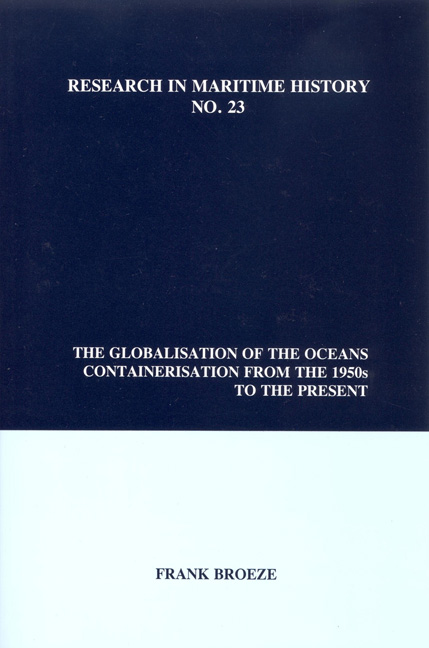Book contents
- Frontmatter
- Table of Contents
- List of Figures
- List of Tables
- Abbreviations
- Acknowledgments
- Preface
- Introduction
- Chapter 1 A Concept and its Realisation
- Chapter 2 The First Revolution
- Chapter 3 The 1970s: Conquering the World
- Chapter 4 The 1980s: Crisis and the Second Revolution
- Chapter 5 The 1990s: Globalisation
- Chapter 6 Ports, Port Systems and Liner Networks
- Chapter 7 Maritime Labour
- Chapter 8 Culture, the Environment and Recycling
- Conclusion
- Select Bibliography
Chapter 8 - Culture, the Environment and Recycling
- Frontmatter
- Table of Contents
- List of Figures
- List of Tables
- Abbreviations
- Acknowledgments
- Preface
- Introduction
- Chapter 1 A Concept and its Realisation
- Chapter 2 The First Revolution
- Chapter 3 The 1970s: Conquering the World
- Chapter 4 The 1980s: Crisis and the Second Revolution
- Chapter 5 The 1990s: Globalisation
- Chapter 6 Ports, Port Systems and Liner Networks
- Chapter 7 Maritime Labour
- Chapter 8 Culture, the Environment and Recycling
- Conclusion
- Select Bibliography
Summary
Economy vs Ecology. This is what it all boils down to.
What has been the influence of containerisation beyond its economic function as the world's maritime and intermodal infrastructure system carrying the predominant share, in value, of the plethora of goods and commodities produced and consumed within the global village? This final chapter will explore the wider implications of the box and its still rapidly growing numbers as well as the alternative uses to which it has been put over the years. As in the previous chapter, several issues are highly box-specific while others (particularly in the environmental arena) transcend the boundaries of container transport and, sometimes, that of the shipping industry in general.
The greatest direct impact containerisation has made on the people of the world is cultural, i.e., the container has become an integral part of the view people hold of the meaning of their world. In the pluralist and global village the exchange of commodities and the intertwining of centres of production and consumption is one of the essential aspects of understanding globalisation. As the ECT video clip suggested, containers connect humanity. The box is carried by sea and on land. Panamax and post-Panamax carriers are as indispensable as modest short-sea and feeder vessels. Semi-trailers and trucks haul it from the remotest producers and penetrate into the furthest nooks for house-to-house delivery. It is a common sight on the highways and byways of all continents.
Intermodalism put the box on transcontinental and international freight trains crossing North America and, to a lesser extent, Europe, Asia and Australasia. Container depots surround port areas, and distribution centres have sprung up beside strategically-located nodal points of motorway and railway networks. When TV news bulletins require illustrations or graphics to accompany stories relating to issues like overseas commerce, the balance of trade, tariff negotiations or the WTO, in most cases container vessels and/or terminals feature in one virtual way or another. By contrast, the box has as yet made no impact on literature or the film industry. The Greek Tycoon was about Aristotle Onassis, not a scheming container operator. But what could be achieved in police dramas by replacing the traditional scrap yard with a container terminal was demonstrated in the Austrian series Kommissar Rex.
- Type
- Chapter
- Information
- The Globalisation of the OceansContainerisation from the 1950s to the Present, pp. 257 - 274Publisher: Liverpool University PressPrint publication year: 2000



